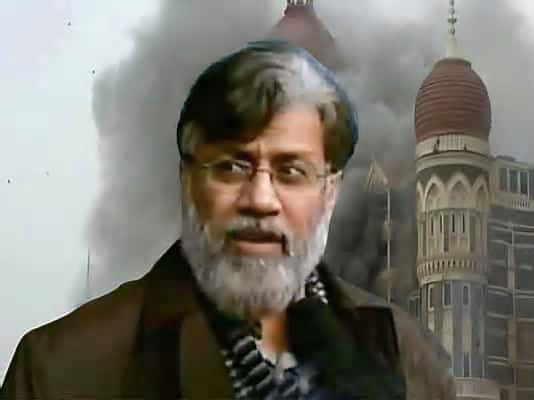A Delhi court has remanded Pakistani-origin Canadian businessman Tahawwur Hussain Rana, an accused in the 26/11 Mumbai terror attacks, to 18-day custody of the National Investigation Agency (NIA).
The order was passed by Special NIA judge Chander Jit Singh of Patiala House Courts on Thursday night.
Appearing for NIA, Senior Advocate Dayan Krishnan sought 20-day custody of Rana.
Rana was arrested in Delhi on Thursday, soon after his extradition from the United States in connection with the Mumbai 26/11 terror attacks.
A day before his arrest, the Central government had appointed Advocate Narender Mann as Special Public Prosecutor for conducting trials and other matters in a case registered by the National Investigation Agency (NIA) against Rana.
As per a gazetted notification issued by the Union Ministry of Home Affairs (MHA) on Wednesday, the SPP would appear before the NIA Special Courts at Delhi and the Appellate Courts on behalf of NIA for a period of three years from the date of publication of this notification or till the completion of the trial of the said case, whichever is earlier.
The US Department of Justice also issued a statement, saying that it has completed the extradition process of ‘convicted terrorist Tahawwur Hussain Rana to stand trial in India on 10 criminal charges stemming from his alleged role in the 2008 Mumbai terrorist attacks committed by Laskhar-e-Tayyiba (Lel), a designated foreign terrorist organisation’.
The statement further said that Rana’s extradition was a critical step towards seeking justice for the six Americans and scores of other victims killed in the heinous attacks. The 64-year-old has been charged in India with numerous offences, including conspiracy, murder, commission of a terrorist act, and forgery.
On April 9, the US Marshals Service executed the Secretary’s surrender warrant by surrendering Rana to Indian authorities for transportation to India. Rana’s extradition is now complete, it added.
On August 15, 2024, the US Court of Appeals for the Ninth Circuit ruled that Pakistani-origin Canadian businessman Tahawwur Rana, wanted for his involvement in the 2008 Mumbai terror attacks, could be extradited to India under the extradition treaty between the two countries.
The three-judge panel at the US Court of Appeals for the Ninth Circuit upheld the verdict passed by the District Court in the Central District of California, which denied Rana’s habeas corpus petition challenging a magistrate judge’s certification that the businessman could be extradited to India for his alleged involvement in the 26/11 Mumbai terror attacks.
Under the limited scope of habeas review of an extradition order, the panel held that Rana’s alleged offence fell within the terms of the extradition treaty between the United States and India, which included a Non Bis in Idem (double jeopardy) exception to extraditability “when the person sought has been convicted or acquitted in the Requested State for the offence for which extradition is requested”.
The panel relied on the State Department’s technical analysis, the plain text of the treaty, and persuasive case law of other circuits, to rule that the word “offence” referred to a charged crime, rather than underlying acts, and required an analysis of the elements of each crime.
It concluded that a co-conspirator’s plea agreement did not compel a different result. The panel held that the Non Bis in Idem exception did not apply because the Indian charges contained distinct elements from the crimes for which Rana was acquitted in the United States.
The panel of judges Milan D Smith, Bridget S Bade, and Sidney A Fitzwater further held that India provided sufficient competent evidence to support the magistrate judge’s finding of probable cause that Rana committed the charged crimes.
The Pakistani national was tried in a US district court on charges related to his support for a terrorist organisation that carried out large scale terrorist attacks in Mumbai.
A jury convicted Rana of providing material support to a foreign terrorist organisation and conspiring to provide material support to a foiled plot to carry out terrorist attacks in Denmark.
However, the jury acquitted Rana of conspiring to provide material support to terrorism related to the attacks in India.
Rana served seven years in prison for the charges. Following his compassionate release, India requested Rana’s extradition to run a trial against him over his alleged involvement in the Mumbai attacks.
Rana argued before the magistrate judge, who initially decided Rana’s extraditability, that the US extradition treaty with India protected him from extradition because of its Non Bis in Idem (double jeopardy) provision. He also argued that India did not provide sufficient evidence to demonstrate probable cause that he committed the charged crimes.
The extradition court rejected Rana’s arguments and certified that he was extraditable. After Rana raised the same arguments in a habeas petition in district court, the habeas court affirmed the extradition court’s findings of facts and conclusions of law.
Rana argued that he cannot be extradited based on conduct for which he was acquitted in the United States because the word “offence” referred to underlying acts. The US government argued that “offence” referred to a charged crime and requires an analysis of the elements of each charged crime.
According to the government, the Treaty permitted Rana’s extradition because the Indian charges contained distinct elements from the crimes for which he was acquitted in the United States.
Judge Smith said that the Treaty’s plain terms, the post-ratification understanding of the signatories, and persuasive precedent all supported the government’s interpretation.
Rana argued that based on the government’s interpretation of the Treaty in Headley’s plea agreement, the government should be judicially estopped from advocating for its current interpretation of the Treaty.
However, the panel rejected his argument and observed that because the parties did not dispute that the crimes charged in India have elements independent from those under which Rana was prosecuted in the United States, the Treaty permitted Rana’s extradition.


